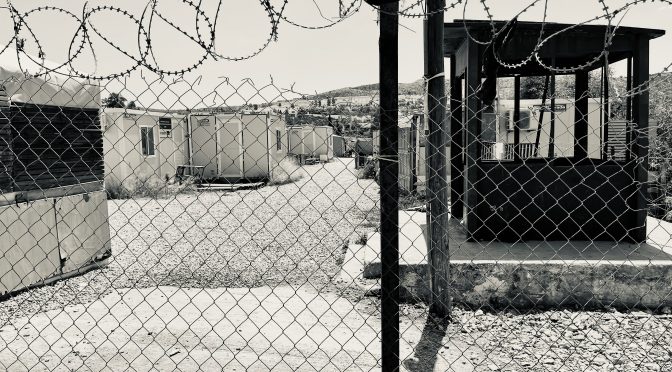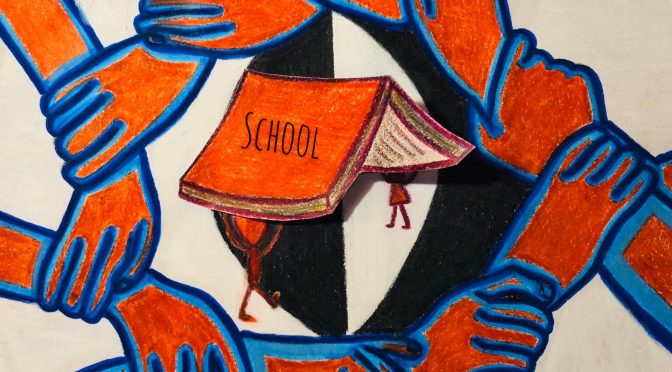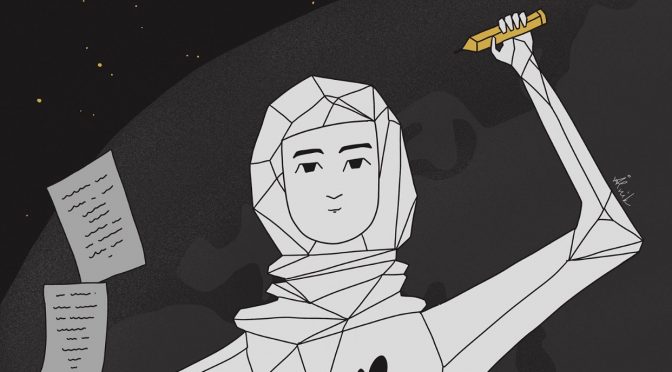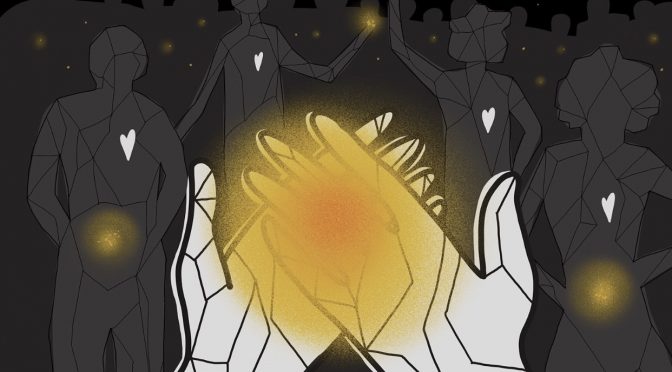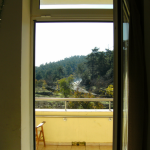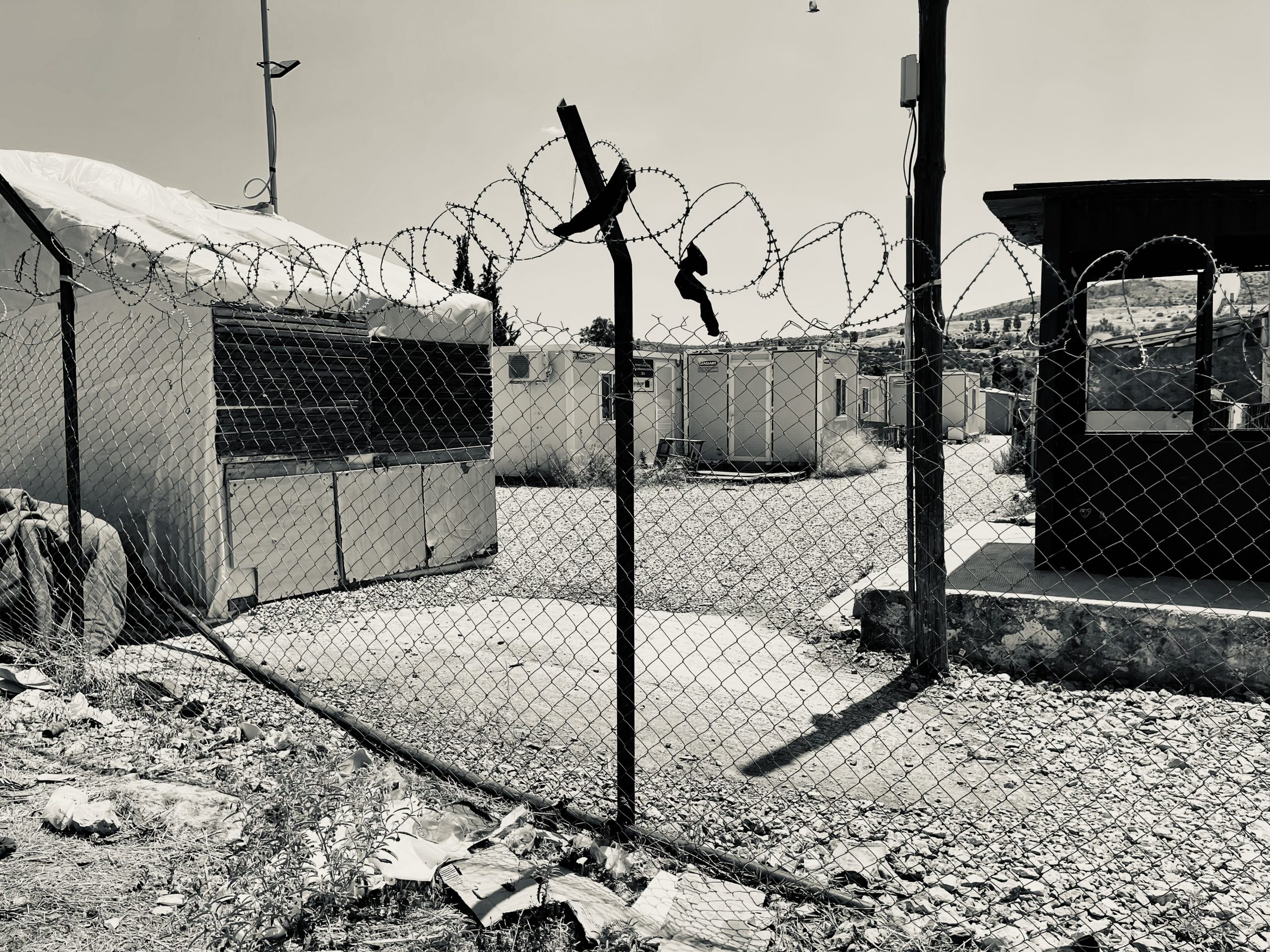
Give me back my microphone!!
Our voice must be heard
When I received the video from one of the inhabitants of the Schisto Camp, which presented the suicide of one person there, I decided to not let this “murder” be kept away from the public eye, as so many tragedies had been kept before. I also decided to participate in the Protest of the People that was to be organized in the camp to raise hundreds of voices denouncing not only the suicide but all the wrongs allowed. What follows is the chronicle of what happened.
Monday, 12.07.2021
I am in the car going to the Schisto camp. Upon arrival, I immediately notice the common elements between this camp and that of Ritsona, where I live. As in Ritsona, here too, a group of asylum seekers is kept, in the midst of nowhere, away from any inhabited town, on a piece of dry land enclosed by barbed wire and chains. As in Ritsona the people live in containers that offer little protection from the
weather, be it winter be it summer. It seems that it is an open camp, as there are no walls around it and we enter from the main gate.
Silence reigns in the camp, and I start doubting that 1100, or more, actually live here.
Once inside, however, I had a chance to meet people. I ask them about their problems and what they want to denounce at the protest. I also ask them if they have anything specific to talk about in front of a camera. All remain silent. I turn to the representative who makes me understand that it is very difficult to receive any feedback from the people as to the conditions they live under.
The microphone is here, but the time of protest has changed. I need to consult with people and inform them about the time change.
Walking along with containers, microphone in my hand, I call people to come out. So does a man with a loudspeaker.
After a short while, I can see women looking out from their windows. Many more, men and women, are coming out. As we pass by the main construction, we are seen by a few social workers. On their uniforms, I read: DRC (Danish Refugee Council).
One of them shouts that we need to move away from the building and that she will call the manager. The people waiting around seem to get worried.
The manager is here now. I am curious to find out what sort of person he is, what methods he adopts, and whether his style of management is military as is the case of
many managers in other camps.
“Hi, you don’t live here, right?” he asks.
“No, we don’t,” we answer.
“Ok, come with me, both of you,” he says, addressing me and the man with the loudspeaker.
We are in his office now, a small dark space, which seems like a detention center in a police station
“Give me your asylum cards!!” he demands.
“You cannot ask for our asylum cards,” we respond. “Here is not a police station.
You don’t have that authority and we have not committed any crime!”
His voice is getting louder and louder, but this does not worry, stress, or threaten me.
“You want to make problems in a peaceful camp, inciting people, with your
microphone, to protest!!”
“I cannot see any peace here. And you cannot call a place peaceful just because it is silent because people are afraid to raise their voice by themselves and call me to support their protest. It is not peaceful here. Only the voices are suppressed.”
“You don’t have permission to come here, you should not be here and cannot do anything without my permission.”
“Is this a closed camp? If not, then there is no reason to impose restrictions. What is the difference between this camp and the ones which have walls around them? If the government does not designate Malakasa, Polyester, Diavata, Nea Kavala and
Ritsona as closed camps, then such camps are open to people from the outside.”
“You are making a problem in a camp that has no problems.”
“No problems? If there is no problem, then what are these people complaining about? Why do they want to demonstrate?”
“They do not have any problem, I have all the statistics”
“Then, something must be wrong with your statistics. You better speak directly with the people to learn their problems.”
“You do not want to understand me!”
“I am just assuming that as manager of the camp, you are listening to people and granting them their right to act, to defend their rights. You should not repress them.”
“I do listen to people, and I am trying to do all I can to avoid demonstrations”
“Demonstration is a basic right of people if they live under a democratic regime. They have a voice; they want to be heard and it is neither up to me nor you to decide whether they can raise that voice. After a long time of waiting, they decided to act
now.
They have been waiting to see what you could do and now that they have seen no action taken, they decided to protest.”
“You do not understand the meaning of democracy! I face so many bureaucratic problems! I am trying to put pressure on the asylum office, I go there and give them the list to get the passports from there.”
“When you talk about democracy you refer only to limitations. These do not constitute democracy. As for putting pressure, let’s collaborate to increase it.
Allowing people to raise their voice will help you and your “efforts” to make the process faster and easier.”
“You do not want to understand!”
“On the contrary, I understand very well. There are two options.
The first entails your giving me back my microphone and us having our demonstration today.
The second entails your talking with the people so that I can be sure that they have no complaint and that they are all satisfied.”
Silence fills the room. His hands move nervously. He seems stressed, highly anxious, and angry. He makes a call to someone. Meanwhile, many people are gathered behind the door. They are all telling us that they want to be included in a dialogue with the manager of the camp.
This is the power of people, what I like the most and respect the most. But the manager ignores their demand to talk with him. He is asking to speak with two persons only, the “elected representatives”! This does not satisfy the people. They insist that the conversation should be with all. They all want to listen to what happens and to find out what is going to be decided about them. He leaves the office. We remain and wait to learn what will happen and what will be his decision. Finally, he comes back.
“All of you come with me!”
We are sitting at a table now. He is on one side of the table with his interpreter and I am on the other, with my pen and notebook. In addition, two representatives are on
the other two sides of the table.
The people stand all around.
The conversation has started and I am writing all the items brought up, one by one.
The first issue is the burial of the young man. His corpse is in a police station and no information is given as to what will happen to him. The manager explains that this problem is the responsibility of the police, not the camp management.
“Yes, but if the camp authorities will not help,” one of the representatives intervenes,
“whom can we ask for help? The family is not even here.”
“What about the length of the asylum granting procedure?” another representative asks.
“We know nothing about the interviews, the decisions taken on the basis of the interviews. No information has been given to us. And we have been waiting for so long.”
“Yeah, the process takes time because there are about 1100 or even more people in the camp. We cannot process the applications of all of them rapidly.”
“It was equally lengthy before when the number of people was smaller Now with more people, it has become impossibly slow.”
The manager insists that the process is not unreasonably slow. At that point, the people bring out their papers to validate their claims.
“These are my papers. Look at the date of our interview. It took place a year ago and still, ave no answer about their decision.
“I have been asking for a change of my surname that is written wrongly, but, again, I have received no answer. I had to go to the office a number of times just for a simple spelling mistake. Still no answer.”
“Yeah, these are one of the bureaucratic problems we have.”
“Is a simple misspelling a bureaucratic problem?”
“My family has been here for two years and our documents are not ready yet.”
“They don’t give the guardianship of my son to me.”
“Did you ask TDH about it?”
“Yeah, I have been asking for four months, but still no answer, they don’t reply to our mails.”
“Terrible. I really didn’t know that they don’t follow up with the problems.”
“It is good that you know it now. Sorry, but this is what I wanted you to learn by speaking with the people.”
“I have been here since 2016,” says one woman. “This is the paper I got at that time from there.”
She exhibits to our view an old paper that seems to have passed many adventures.
Most likely it will pass many more and will have more stories to tell.
She adds, “I was in Hellions camp four 4 years and then they transferred me here.
After one month, they gave me the date for an interview whose purpose now will be for me to prove that Turkey, not my country Afghanistan, is a dangerous place for my life. That is what the new policy of the Greek government dictates. I am here because my life was threatened in Afghanistan, not in Turkey. Turkey was simply the
territory we had to pass in order to arrive at safety in Europe. This new policy will justify the rejection of my application for asylum and will permit my deportation to Turkey. I have psychological problems. In spite of them, I will have to pass my interview and then, most likely, be sent back to Turkey and from there to my country.
What a prospect! It would have been much better to commit suicide than be killed by the Taliban there.”
“You were in Hellions for 4 years and they never gave you an interview?”
“No, they didn’t. I have gotten it only now that I am here and after the new policy that requires my justification as to why Turkey is a dangerous place for my life”
“Oh, I didn’t know about it. In Helionas there are some more similar cases.
Don’t worry, however, we have not had any rejections from this camp, even after the interviews focus on Turkey and not the country of origin.
“Who says we have not had any rejections in the camp. On the contrary, we have had many families rejected.”
“No, we have not”
“I am asking people to call those who have already gotten their first rejection after the policy change about Turkey.”
“Okay sir, you were saying that there has been no such rejection in the camp and that there is no reason for us to protest. Now, after listening to the people for a bit, do you still refuse to give me the microphone and let us all protest??”
“I want to know who got rejected, I want to see them. How can I otherwise believe that it has happened”
“Okay, they have already been called. They are coming.”
“Hello, I am the mother of the family that got rejected. My husband is in Athens. The lawyer called him to follow up on our process with the second rejection.”
“Give me the paper that says you are rejected!!”
“We have not gotten the decision of rejection, but when the lawyer called us, he told us that our case was rejected”
“Oh, I really did not know about it. Bring me your papers, after the decision is made and communicated to you.”
“We cannot wait until all families will be rejected and then search for a solution to stop this outcome. If this process is wrong and you believe it is so, then let us take action to stop it.
Who will pay the value of those lives that are now in danger – the lives that are put at risk of life and death as people are trying to cross deadly borders to arrive at the center of Europe? Who will pay the value of many children’s education and future as they are now over age and have no chance to go to school?
You are trying to hide all these problems, telling us that you are not informed and claiming that your statistics are right. If that were the case, we would have never been forced to act, to protest, and to stand up for justice.”
My conversation with the manager is almost over. There are no more words left. It seems that he has understood all that he needs to know.
In the end, never reflecting on the system, he goes to his office. Before leaving the camp, I give him my book. After that day, I became concerned that the camps foreclose any discussions about
the meaning of human rights, freedom and justice.
Furthermore, they foreclose any possibility about exchanges that would allow us to explain the reasons we are here, our previous lives, our background. The very existence of camps set apart by
barbwires and walls prevents and collaborative action that would eradicate violent acts such as suicides and fighting among groups. People who are kept in detention, not reception as they call them centers, are already criminalized. Prisons breed violence and people that are detained there are often pushed to frustrated violence and when they get out they are changed to the worst.
So how does one persuade people to think differently? About life, about hope, about brightness and good days. We still need to call for change, less violence, less repression, call for reform and rehabilitation. By visiting different camps, I am getting more and more convinced that behind the policies applied and the privatization of institutions dealing with immigration, there is money to be made. The more we are, the higher the possibility for profits. We are like enslaved people in a society which
claims to be democratic. In the path of challenging the basic structures of this society by resistance and action, I am only the tip of an iceberg.

